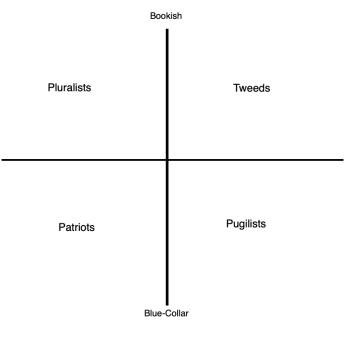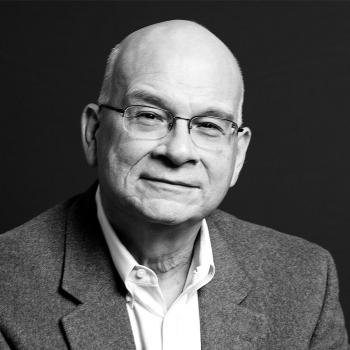 Over the last few months, in various corners of the internet I’ve started to notice a certain backlash against a “neo-fundamentalism” that is (allegedly) emerging among conservative American Protestants. A common target of such (implicit or explicit) attacks appears to be the publication American Reformer—where, full disclosure, I’ve published some prior work.
Over the last few months, in various corners of the internet I’ve started to notice a certain backlash against a “neo-fundamentalism” that is (allegedly) emerging among conservative American Protestants. A common target of such (implicit or explicit) attacks appears to be the publication American Reformer—where, full disclosure, I’ve published some prior work.
Danny Slavich characterizes this neo-fundamentalism as follows:
First, the new fundamentalism holds secondary and tertiary doctrines as tightly as core Christian convictions, seeing them as a dividing line of orthodoxy. Second, the new fundamentalism embraces a narrow view of the authority of Scripture, wrongly assuming that one can interpret Scripture as a blank slate and without any existing theological convictions. Third, the new fundamentalism aligns itself ideologically with “conservative” forms of Republican politics, even conflating Republican positions with theological conservatism.
Attorney and commentator David French makes a similar point in a recent newsletter, positing that evangelicals—as opposed to “bad” fundamentalists—are
more apt to seek knowledge and insight about the world from secular sources, taking ideas from psychology, sociology, and critical theory to help understand complex cultural, political, and historical questions. That’s hardly the universal Christian approach, and more fundamentalist Christians have long looked askance at the social sciences (including each discipline above) and are more apt to argue that the solution to the race problem in America is found in the Bible alone.
I’m particularly intrigued by these critiques because I’m pretty sure they’re counterarguments against an approach to Protestant intellectual engagement that I’ve publicly defended. Specifically, I argued in a lengthy October article that a significant amount of recent scholarship, by authors who seem to be interested in calling conservative American Protestants to change their ways and beliefs, tends to construe theological claims as essentially dependent upon more primordial systems of power, which social-scientific disciplines like sociology and history are believed to disclose in their “objectivity.” And this method, I contended (and would still contend) is not really one that can give rise to a sustainable Christian theology: if theology is just derivative of some secular science or other, why keep it around at all? The critique of power that characterizes much of contemporary academe requires some metaphysical guardrails if it is not to become totalizing—but it is very hard to understand how such guardrails could ever be justified.
Let’s now turn to French’s post. To be clear, what I’ve outlined above is not an argument that Christians should not “seek knowledge and insight about the world from secular sources.” Far from it. Rather, it’s an argument that the very idea of “secular sources,” as resources that have no theological or normative significance for other fields, is itself unstable. But don’t take it from me; take it from “Jewish-Buddhist” writer Jason Ānanda Josephson Storm, who explains how this similar instability is endemic to the social sciences:
To determine the boundaries of the ‘political’ is itself a political decision, benefiting some partisan groups over others. To confer on a particular thing membership in the category is often interpreted as an expression of value or subjective preference. . . . Values turn out to be inexplicably linked to the object, and attempts to purge them often turn out to be self-defeating.
Now, I could be wrong, but I don’t think this kind of “disciplinary autocritique” is characteristic of what is traditionally termed “fundamentalism.” (Maybe it’s out there somewhere in the depths of the post-Van Tillian intellectual ecosystem.) The point is, ideas and arguments from any discipline always come freighted with a set of assumptions about the way the world is and the way it should be. And attempting a surface-level reconciliation of positions that have radically different intellectual provenances is a recipe for instability.
Absolutely none of that, though, is to say that Christians can’t pick up useful subject-matter knowledge, or creative spurs to further reflection, from unfamiliar or hostile places. I certainly don’t experience my day-to-day intellectual life with the sort of taut, always-ready-to-pop-off anger or fear that French (and Slavich) seem to associate with “neo-fundamentalism.” The point is simply this: seek to understand the grid through which seemingly “neutral” information is being presented to you, and reason accordingly.
With that in mind, let’s revisit Slavich’s definition of “neo-fundamentalism.”
First: to the extent that “secondary and tertiary doctrines”—e.g., a traditional understanding of roles in the church—are being defended more vigorously now than in prior generations, that’s because some of these doctrines are coming under attack through application of a method that implicates primary doctrines. (Does the biblical moniker “God the Father” reinforce patriarchal norms? If “fighting patriarchy” is adopted as a methodological principle that can override fairly straightforward biblical language, it’s hard to see why not.)
Second: Slavich is surely right that no one approaches the biblical text without presuppositions, but this does not mean that all presuppositions are equally warranted. As Robert Jenson has argued, one reads the Bible with, not against, the church.
Third: I’m happy to concede that one’s theology shouldn’t track a specific contingent political project, but to paraphrase Alasdair MacIntyre, “whose Republican politics”? Paleoconservatism? Libertarianism? Neoconservatism? “Conservatism” is a big tent, after all. And it is only trivially true that those with conservative theological views will be inclined to support political efforts that—at the very least—seem more consonant with those views.
For whatever it’s worth, I don’t think “fundamentalist” is really useful as a classificatory term at all—I’m a fan of Alvin Plantinga’s quip that the label “fundamentalist” usually tends to serve as a general derogatory term, indicating “something like ‘stupid sumbitch whose theological opinions are considerably to the right of mine.’” If we must keep the term around, I’d favor cabining it to individuals who believe strongly in the principle of “secondary separation,” or dissociation from individuals who are themselves associated with those “outside the fold” in some sense. That, at least, would have a stronger historical warrant.
In any case, when all’s said and done, I don’t think the line of argument I’ve sketched here represents a kind of angry “neo-fundamentalist” regression or flight from culture so much as it represents an increasing awareness of the non-independence of diverse intellectual domains. And that is an insight well worth taking to heart in any era.












